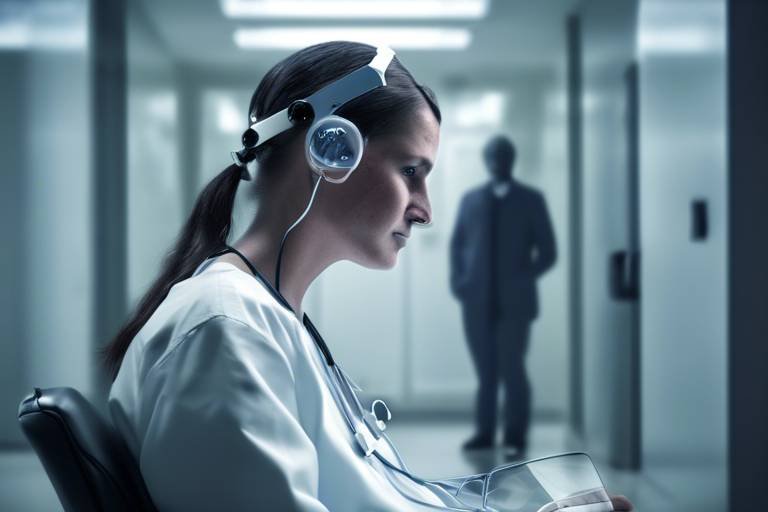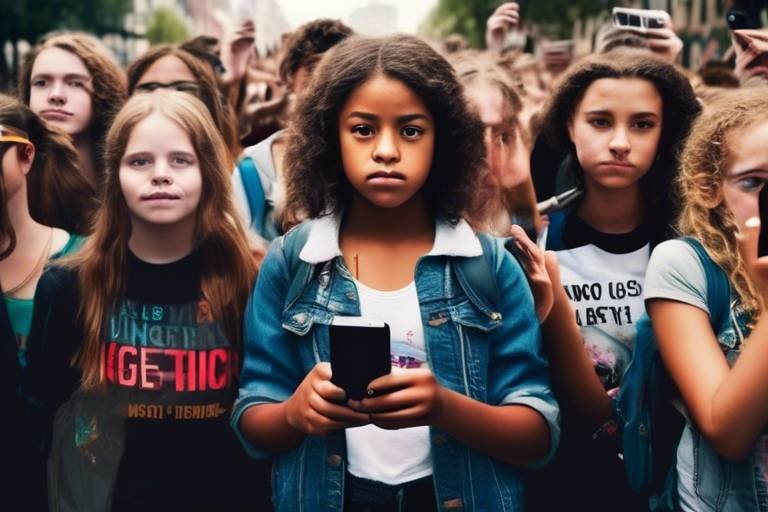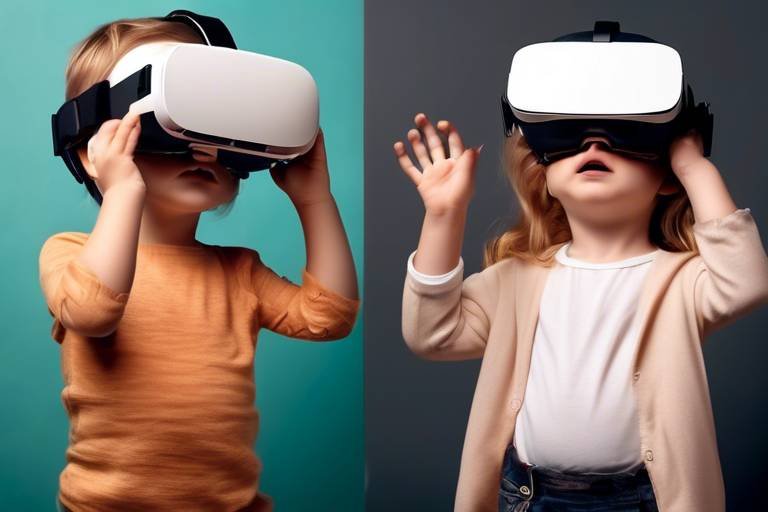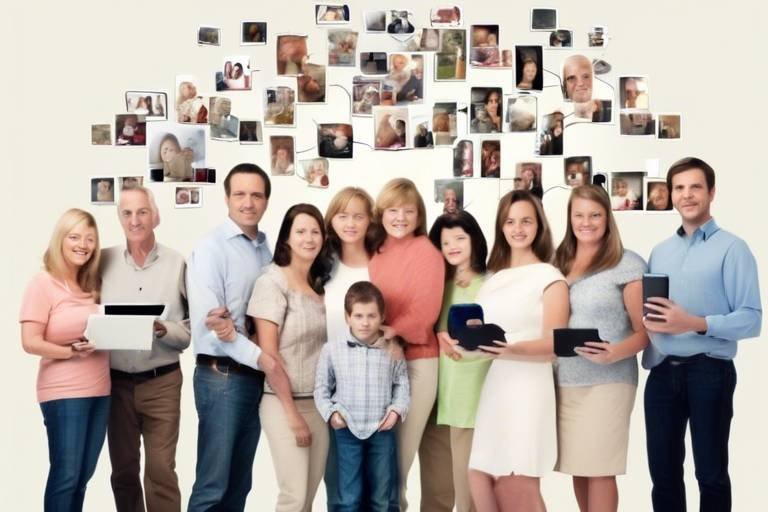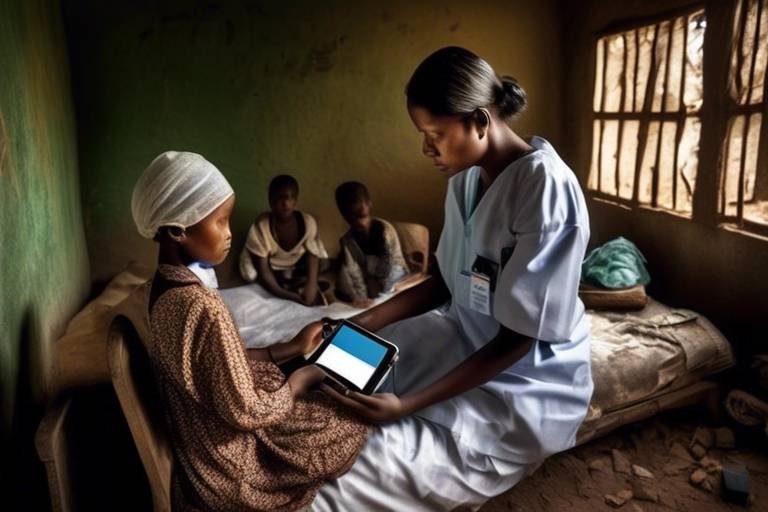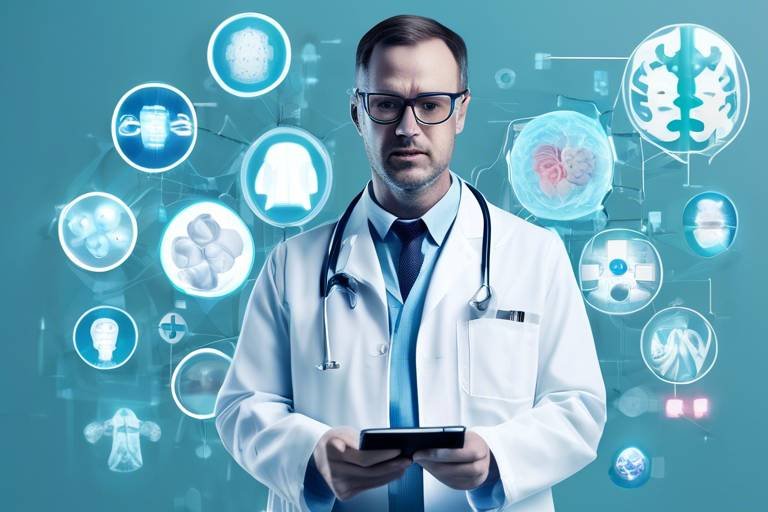How Tech is Shaping the Future of Mental Health Care
In today's fast-paced world, the intersection of technology and mental health care is not just a trend; it's a revolution. Imagine being able to access professional mental health support from the comfort of your home, or having a personal mental wellness coach right in your pocket. This is the new reality, and it’s reshaping the landscape of mental health care in ways we never thought possible. With the rise of teletherapy, mobile health applications, and artificial intelligence, the future of mental health care is bright, innovative, and, most importantly, more accessible than ever before.
As we delve deeper into this topic, we will explore how these technological advancements are breaking down barriers, providing support, and enhancing the overall mental health experience. The journey of mental health care is evolving from traditional face-to-face interactions to a more flexible, user-centered approach that leverages the power of technology. It's like moving from a dusty old library to a sleek, interactive e-book platform—suddenly, a wealth of information and support is just a click away.
However, this transformation doesn’t come without its challenges. As we embrace these new tools, we also need to address issues related to data privacy, accessibility, and the ethical implications of using technology in such a sensitive field. In the following sections, we will uncover the benefits and challenges of teletherapy, the effectiveness of mobile health applications, and the role of artificial intelligence in diagnostics and treatment. Get ready to explore how technology is not just enhancing mental health care but redefining it for generations to come!
Teletherapy, or online therapy, has emerged as a game-changer in the mental health space. With the ability to connect with therapists via video calls, phone calls, or even chat, patients can receive the support they need from anywhere in the world. This accessibility is particularly beneficial for individuals living in rural areas or those with mobility challenges. Imagine being able to discuss your feelings and experiences without the stress of commuting or waiting in a crowded waiting room—it's a breath of fresh air!
Moreover, the stigma surrounding mental health care is gradually diminishing, and teletherapy is at the forefront of this cultural shift. Many people feel more comfortable opening up in a familiar environment, such as their own home. However, it's essential to acknowledge that teletherapy also presents challenges, such as the need for reliable internet access and the potential for miscommunication without non-verbal cues. Despite these hurdles, the increasing acceptance of virtual therapy in the healthcare community signals a promising future for mental health support.
Mobile health apps have become indispensable tools for managing mental health, offering everything from mood tracking to guided meditations. These applications empower users to take charge of their mental well-being by providing resources that are easily accessible and often tailored to individual needs. For instance, some apps allow users to log their daily moods and identify patterns, which can be incredibly insightful for both users and their therapists. It's like having a personal therapist in your pocket, ready to assist you whenever you need it!
Not all mental health apps are created equal. The most effective ones share several key features that enhance user experience and outcomes:
- User-friendly interfaces: A simple, intuitive design encourages users to engage with the app regularly.
- Personalized content: Tailored recommendations based on user input can significantly improve engagement and effectiveness.
- Integration with professional care: The best apps allow users to share their progress with therapists, ensuring a comprehensive approach to mental health.
By understanding these elements, users can choose apps that best suit their needs, ultimately leading to better mental health outcomes.
As mobile health applications gain popularity, concerns about data privacy have become increasingly prominent. Users often share sensitive information, and safeguarding this data is crucial. Developers must prioritize user confidentiality by implementing robust security measures. It's vital for users to be informed about how their data is used and what steps are taken to protect it. After all, trust is the foundation of any therapeutic relationship, even in a digital space.
Real-life examples of successful mobile health applications illustrate their positive impact on users. For instance, apps like Headspace and Calm have helped millions manage stress and anxiety through mindfulness practices. These case studies not only highlight the effectiveness of technology in mental health care but also serve as inspiration for future innovations.
Despite the myriad of benefits that mobile health applications offer, several challenges remain. Issues such as digital literacy, accessibility for all demographics, and the need for regulatory frameworks can hinder the widespread adoption of these tools. Addressing these barriers is essential to ensure that everyone can benefit from the advancements in mental health technology.
Artificial intelligence is making waves in the field of mental health diagnostics. By analyzing vast amounts of data, AI algorithms can improve diagnostic accuracy and help personalize treatment plans for patients. This technology can identify patterns that even the most experienced professionals might overlook, providing a more comprehensive understanding of a patient's mental health.
Machine learning techniques are also being integrated into therapeutic practices. Imagine a therapy session where the technology provides real-time feedback to both the therapist and the patient, adjusting strategies based on the patient's responses. This adaptive approach can enhance therapy effectiveness, making sessions more productive and tailored to individual needs.
However, the use of AI in mental health care raises important ethical questions. Concerns about bias in algorithms, data usage, and the potential loss of the human touch in therapy must be addressed. Establishing ethical guidelines is crucial to ensure that technology serves as a complement to, rather than a replacement for, human interaction in mental health care.
Q: How can I find a reliable teletherapy service?
A: Look for licensed professionals with positive reviews and ensure that the platform complies with privacy regulations.
Q: Are mobile health apps effective for everyone?
A: While many users find them helpful, effectiveness can vary based on individual needs and preferences.
Q: What should I do if I have concerns about data privacy with an app?
A: Research the app's privacy policy and look for reviews discussing security measures before using it.

The Rise of Teletherapy
In recent years, teletherapy has emerged as a groundbreaking solution for mental health care, reshaping how individuals access therapy and support. Imagine being able to connect with a qualified therapist from the comfort of your own home, wearing your favorite pajamas, and sipping on a warm cup of tea. Sounds cozy, right? This convenience is one of the key reasons why teletherapy has gained traction, especially in a world where mental health awareness is at an all-time high.
Teletherapy allows patients to engage in therapy sessions via video calls, phone calls, or even text messaging. This flexibility is particularly beneficial for those who may have difficulty attending in-person sessions due to various reasons such as geographical limitations, physical disabilities, or simply a busy schedule. The ability to access therapy from anywhere has not only increased the number of people seeking help but has also made mental health services more inclusive. However, like any innovation, teletherapy comes with its own set of challenges.
One of the most significant advantages of teletherapy is the reduction of stigma associated with seeking help. Many individuals feel more comfortable discussing their mental health issues in a familiar environment, which can lead to more open and honest conversations. Furthermore, teletherapy can provide immediate support during crises, offering a lifeline to those in need. However, it’s essential to recognize that not everyone may feel comfortable with this format. Some may prefer the traditional face-to-face interaction, which fosters a deeper emotional connection.
As with any emerging technology, teletherapy faces challenges that need to be addressed. Issues such as internet connectivity, digital literacy, and privacy concerns can hinder its effectiveness. For instance, a patient living in a rural area may struggle with a poor internet connection, making it difficult to maintain a consistent therapy schedule. Moreover, not all individuals are tech-savvy, which can create barriers to accessing these valuable services. It’s crucial for mental health professionals to provide adequate support and resources to help clients navigate these challenges.
Despite these hurdles, the acceptance of teletherapy within the healthcare community is growing. Many therapists have adapted their practices to include virtual sessions, and numerous studies have shown that teletherapy can be just as effective as traditional therapy. For example, a recent study found that patients who engaged in teletherapy reported similar levels of satisfaction and improvement in their mental health as those who attended in-person sessions. This growing body of evidence is paving the way for teletherapy to become a standard practice in mental health care.
In conclusion, the rise of teletherapy is a testament to the evolving landscape of mental health care. It offers a unique blend of convenience, accessibility, and flexibility, making it an attractive option for many. As we continue to embrace technology in our daily lives, it’s essential to ensure that mental health services keep pace with these changes, providing support to those who need it most. The journey is just beginning, and the future of teletherapy looks promising.
- What is teletherapy? Teletherapy is a form of therapy that allows individuals to connect with mental health professionals via digital platforms such as video calls, phone calls, or messaging.
- Is teletherapy as effective as in-person therapy? Yes, many studies have shown that teletherapy can be just as effective as traditional therapy, with similar levels of patient satisfaction and improvement.
- What are the challenges of teletherapy? Challenges include internet connectivity issues, digital literacy, and privacy concerns, which can affect the accessibility and effectiveness of services.
- Can anyone use teletherapy? While teletherapy is accessible to many, it may not be suitable for everyone, especially those who prefer face-to-face interactions or have specific needs that require in-person care.

Mobile Health Applications
In recent years, have emerged as game-changers in the realm of mental health management. These apps offer convenient and immediate access to resources that help individuals track their moods, manage anxiety, and monitor their therapy progress from the comfort of their own homes. Imagine having a therapist in your pocket, ready to provide support at any moment! This level of accessibility is particularly crucial in today's fast-paced world, where traditional therapy sessions may not always fit into busy schedules.
One of the most significant advantages of mobile health applications is their ability to cater to a wide range of mental health needs. Whether someone is dealing with depression, anxiety, or stress, there are specialized apps designed to provide tailored support. For instance, some apps focus on mindfulness and meditation, while others offer cognitive-behavioral therapy tools or mood tracking features. The diversity in offerings means that users can find an app that resonates with their unique experiences and preferences.
However, the effectiveness of these applications can vary significantly. To truly understand what makes a mental health app effective, we need to look at its features. The best apps often include:
- User-friendly interfaces: A clean and intuitive design makes it easier for users to navigate the app and utilize its features.
- Personalized content: Tailoring the experience to individual needs can enhance engagement and motivation.
- Integration with professional care: Some apps allow users to share their progress with therapists or counselors, creating a more cohesive treatment plan.
Despite the benefits, it's essential to acknowledge that not every app is created equal. Some may lack scientific backing or adequate security measures, leading to privacy concerns. As users become increasingly reliant on these digital tools, developers must prioritize data privacy and implement robust security protocols to safeguard personal information. After all, no one wants their private struggles to be exposed.
To illustrate the impact of mobile health applications, let's take a look at some successful examples. Research has shown that apps like Headspace and Calm have significantly improved users' mental well-being by providing structured mindfulness practices and relaxation techniques. These apps have garnered millions of downloads, highlighting their effectiveness in reaching a broad audience.
However, the journey for mobile health applications isn't without challenges. For many potential users, issues such as digital literacy and access to technology can be significant barriers. Furthermore, regulatory frameworks are still catching up with the rapid pace of technological advancement, leaving some apps unregulated and potentially unsafe.
In conclusion, mobile health applications are reshaping the landscape of mental health care by providing innovative solutions for users seeking support. As technology continues to evolve, we can expect to see even more advancements that will enhance the way we approach mental health management. The future is bright, but it’s crucial that we navigate this new terrain with caution, ensuring that accessibility and safety remain at the forefront of our efforts.
Q: Are mobile health applications effective for everyone?
A: While many people find them helpful, the effectiveness can vary based on individual needs and the specific app used.
Q: How do I choose the right mental health app?
A: Look for apps with positive reviews, user-friendly interfaces, and features that align with your mental health goals.
Q: Are my personal data safe when using these apps?
A: It's essential to choose apps that prioritize data privacy and have clear security measures in place.

Features of Effective Apps
When it comes to mental health apps, not all are created equal. The most effective apps share certain key features that elevate user experience and promote better mental health outcomes. First and foremost, a user-friendly interface is crucial. Imagine trying to navigate a complex maze while feeling anxious; the last thing you want is an app that adds to your stress. A clean, intuitive design allows users to focus on their mental health rather than struggling with technology.
Another vital feature is personalized content. Mental health is not a one-size-fits-all scenario. Users benefit greatly from apps that tailor content to their specific needs, whether it’s guided meditations, mood tracking, or coping strategies. For instance, an app that adjusts its recommendations based on user input can make a significant difference in how effectively it supports mental well-being.
Integration with professional care is also essential. Apps that allow users to connect with therapists or mental health professionals provide a more holistic approach to care. This feature not only bridges the gap between self-help and professional assistance but also fosters a sense of community and support. Imagine having a therapist just a click away when you need them most; that’s the power of effective app integration.
Moreover, features like real-time feedback can enhance the therapeutic experience. Some advanced mental health apps utilize machine learning algorithms to analyze user data and provide instant insights. This means that if a user reports feeling particularly anxious after a stressful event, the app can suggest immediate coping strategies or mindfulness exercises tailored to that moment. It's like having a personal coach in your pocket, ready to guide you through tough times.
Lastly, effective mental health apps prioritize data privacy. Users must feel safe sharing their personal information. Developers should implement robust security measures, such as encryption and anonymization, to ensure that user data remains confidential. A breach of trust can deter users from engaging with the app, undermining its potential benefits. Therefore, transparency about data usage and security protocols is essential in building user confidence.
In summary, the features that make mental health apps effective go beyond just functionality. They encompass user-friendliness, personalization, professional integration, real-time feedback, and stringent data privacy measures. By focusing on these aspects, developers can create tools that not only support users in their mental health journeys but also empower them to take charge of their well-being.
- What are the benefits of using mental health apps? Mental health apps can provide resources for self-help, track mood changes, and offer coping strategies, making them valuable tools for managing mental health.
- Are mental health apps effective? Yes, when they incorporate key features like personalization and integration with professional care, they can significantly improve mental health outcomes.
- How can I ensure my data is safe with these apps? Look for apps that prioritize data privacy, use encryption, and are transparent about their data usage policies.

Data Privacy Concerns
In today's digital age, the integration of technology in mental health care comes with its own set of challenges, and one of the most pressing issues is data privacy. As mobile health applications continue to gain traction, protecting sensitive personal information has become paramount. Patients often share intimate details about their mental health, and the thought of this data falling into the wrong hands can be frightening. It's not just about the data itself, but also about the trust that patients place in these platforms.
Many users may not fully understand how their data is being collected, used, and stored. For instance, while some apps may claim to prioritize user confidentiality, the reality can be quite different. It's essential for app developers to be transparent about their data handling practices. This includes informing users about:
- What data is being collected
- How it will be used
- Who will have access to it
- How long it will be stored
Moreover, with the increasing sophistication of cyber threats, the risk of data breaches is a significant concern. A breach can not only compromise personal information but also lead to severe emotional distress for users who may feel vulnerable after such an incident. Therefore, it is crucial for developers to implement robust security measures, such as encryption and secure authentication protocols, to safeguard user data.
To further emphasize the importance of data privacy, let’s consider a few statistics that highlight the issue:
| Statistic | Percentage |
|---|---|
| Users concerned about data privacy | 85% |
| Apps that lack clear privacy policies | 60% |
| Users who would stop using an app after a data breach | 70% |
In light of these concerns, regulatory frameworks are also being discussed to ensure that mental health apps adhere to strict privacy standards. Such regulations would not only protect users but also enhance the credibility of these applications in the healthcare market. As users become more aware and educated about their data rights, the demand for transparency and accountability will only grow.
Ultimately, while technology has the potential to revolutionize mental health care, it is essential that we prioritize data privacy to foster a safe environment for users. By addressing these concerns head-on, developers can build trust and create a more supportive landscape for mental health management.
What should I look for in a mental health app regarding data privacy?
When choosing a mental health app, look for clear privacy policies, data encryption, and user control over personal information. Ensure the app is transparent about how your data is used.
Can my mental health data be shared with third parties?
Many apps may share data with third parties for various purposes, including advertising or research. Always check the app's privacy policy to understand how your data may be shared.
What happens if a mental health app experiences a data breach?
In the event of a data breach, you may be notified by the app provider. It's crucial to change your passwords and monitor your accounts for any suspicious activity.
Are there regulations to protect my data on mental health apps?
Yes, there are regulations like HIPAA in the U.S. that protect personal health information. However, not all apps may comply, so it's essential to verify their adherence to privacy standards.

Case Studies of Success
The impact of mobile health applications on mental health care is not just theoretical; it’s backed by compelling case studies that showcase real-world successes. One standout example is the app called Woebot, an AI-driven chatbot designed to provide cognitive behavioral therapy (CBT) techniques. Users have reported significant reductions in anxiety and depression symptoms after using Woebot for just a few weeks. This success story highlights how technology can offer immediate support, making mental health care more accessible to those who may not otherwise seek help.
Another notable case is Headspace, a meditation and mindfulness app that has transformed the way people approach mental well-being. By incorporating guided meditations and mindfulness exercises, Headspace has garnered millions of users worldwide. Research indicates that regular use of the app leads to improved emotional regulation and decreased stress levels. In fact, a study conducted by the University of California found that participants who used Headspace reported a 14% increase in overall well-being within just 10 days of daily practice.
Moreover, a case study involving the Calm app demonstrated its effectiveness in workplace mental health initiatives. Companies that integrated Calm into their employee wellness programs observed a 30% reduction in reported stress levels among employees. This not only improved individual mental health but also enhanced overall workplace productivity. The success of these applications underscores the potential for technology to bridge gaps in mental health care, especially in underserved communities.
What makes these apps particularly effective? They often include features such as:
- User-friendly interfaces: Easy navigation encourages regular use.
- Personalized content: Tailored recommendations based on user preferences and needs.
- Integration with professional care: Many apps offer options to connect with licensed therapists for additional support.
These case studies not only illustrate the success of individual applications but also highlight a broader trend in mental health care: the shift towards technology-driven solutions that prioritize accessibility and user engagement. As we move forward, it’s essential to continue evaluating the effectiveness of these tools and ensuring they meet the diverse needs of users. The future of mental health care is undoubtedly intertwined with technology, and these success stories are just the beginning.
Q1: How effective are mobile health applications for mental health?
A1: Many studies indicate that mobile health applications can significantly improve mental health outcomes by providing users with tools for self-management, immediate support, and access to professional care.
Q2: Are these apps safe to use?
A2: While most reputable apps prioritize user privacy and data security, it’s essential to research and choose applications that adhere to strict data protection standards.
Q3: Can mobile health apps replace traditional therapy?
A3: While they can be a valuable supplement to traditional therapy, mobile health apps are not a complete replacement for professional mental health services, especially for severe mental health conditions.
Q4: What features should I look for in a mental health app?
A4: Look for user-friendly interfaces, personalized content, evidence-based techniques, and options for connecting with licensed therapists.

Challenges in Implementation
The journey toward integrating mobile health applications into mental health care is not without its bumps in the road. Despite the promising benefits these technologies offer, there are several challenges that must be addressed for successful implementation. One of the primary hurdles is digital literacy. Not everyone is comfortable using technology, and for many individuals, especially older adults, navigating mobile applications can feel daunting. This lack of familiarity can lead to frustration and ultimately deter users from utilizing these valuable resources.
Another significant challenge is accessibility. While mobile health applications can theoretically reach a wide audience, the reality is that not everyone has access to the necessary devices or reliable internet connection. In rural areas or low-income communities, these barriers can prevent individuals from seeking help, perpetuating the cycle of mental health issues that go unaddressed. To illustrate this point, consider the following table that highlights the disparities in technology access across different demographics:
| Demographic | Internet Access (%) | Smartphone Ownership (%) |
|---|---|---|
| Urban Areas | 90 | 85 |
| Rural Areas | 65 | 70 |
| Low-Income Families | 55 | 60 |
Moreover, the need for regulatory frameworks cannot be overlooked. As mobile health applications become more prevalent, establishing guidelines to ensure their safety and efficacy is crucial. Without proper regulations, the risk of misinformation or ineffective treatment options increases, potentially harming users rather than helping them. This regulatory gap can create uncertainty among healthcare providers who may be hesitant to recommend these tools to their patients.
Additionally, there is a pressing need for interdisciplinary collaboration. Mental health professionals, app developers, and policymakers must work together to create solutions that are not only effective but also user-friendly. This collaboration can help bridge the gap between technology and mental health care, ensuring that applications are designed with the needs of users in mind.
Lastly, ongoing education and support for both users and providers are essential. As technology evolves, so too must the understanding and skills of those who use it. Offering training sessions, workshops, and resources can empower users to make the most of these applications while also equipping providers with the knowledge they need to support their patients effectively.
In conclusion, while mobile health applications hold immense potential for enhancing mental health care, overcoming these challenges is vital for their successful implementation. By addressing issues of digital literacy, accessibility, regulation, collaboration, and education, we can pave the way for a future where technology and mental health care work hand in hand to improve outcomes for everyone.
- What are mobile health applications?
Mobile health applications are software programs designed to help users manage their health and wellness, including mental health, through their smartphones or other mobile devices. - How can I choose the right mental health app?
Consider factors such as user reviews, professional endorsements, features that meet your needs, and data privacy policies when selecting an app. - Are mobile health apps effective?
Many studies indicate that mobile health apps can be effective in supporting mental health by providing resources, tracking progress, and enhancing communication with professionals. - What should I do if I encounter issues with a mental health app?
If you experience problems, reach out to the app's customer support, check for updates, or consult with a mental health professional for alternative resources.

AI and Mental Health Diagnostics
Artificial Intelligence (AI) is rapidly transforming the landscape of mental health diagnostics. Imagine a world where your therapist is not just a human, but also a sophisticated algorithm capable of analyzing your emotions and behaviors with remarkable precision. This is not science fiction; it’s happening now! AI algorithms can sift through vast amounts of data, identifying patterns and correlations that may escape even the most seasoned mental health professionals. By leveraging data from various sources—such as social media interactions, wearable devices, and even speech patterns—AI can provide insights that significantly enhance diagnostic accuracy.
One of the most exciting aspects of AI in mental health diagnostics is its ability to personalize treatment plans. Traditional methods often rely on generalized assessments, which can lead to one-size-fits-all solutions. However, with AI, the focus shifts to the individual. Algorithms can analyze a patient’s unique history, preferences, and responses to previous treatments, tailoring interventions that are much more likely to resonate with the patient. This personalized approach not only improves outcomes but also fosters a stronger therapeutic alliance between patients and their healthcare providers.
Moreover, AI can serve as an invaluable tool for early detection of mental health issues. For instance, machine learning models can analyze user data to flag potential signs of anxiety or depression before they escalate into more severe conditions. This proactive approach can be life-saving, enabling individuals to seek help at critical junctures. AI-driven assessments can also be conducted through various platforms, making it easier for individuals to access mental health evaluations from the comfort of their homes.
However, the integration of AI into mental health diagnostics is not without its challenges. Ethical considerations loom large, particularly concerning data privacy and the potential for algorithmic bias. It’s crucial that developers prioritize the ethical implications of their technologies, ensuring that AI tools are not only effective but also equitable and respectful of user privacy. For instance, if an AI system is trained on biased data, it may inadvertently reinforce stereotypes or overlook certain populations entirely. Thus, establishing robust ethical guidelines and regulatory frameworks is essential to navigate these complexities.
As we look to the future, the potential for AI in mental health diagnostics is immense. It can augment human capabilities, providing mental health professionals with advanced tools to enhance their practice. Imagine a scenario where a therapist receives real-time data-driven insights during a session, allowing for immediate adjustments to the treatment approach. This synergy between human expertise and AI technology could redefine how we understand and treat mental health conditions.
In summary, while AI holds great promise for enhancing mental health diagnostics, it is essential to approach its implementation thoughtfully. As we embrace these technological advancements, we must remain vigilant about the ethical implications and strive to create a balanced ecosystem where technology and human touch coexist harmoniously.
- How does AI improve mental health diagnostics? AI improves diagnostics by analyzing large datasets to identify patterns that may indicate mental health issues, allowing for more accurate and personalized treatment plans.
- What are the ethical concerns surrounding AI in mental health? Ethical concerns include data privacy, potential biases in algorithms, and the need to maintain a human touch in therapy.
- Can AI detect mental health issues early? Yes, AI can analyze user data to flag early signs of mental health issues, enabling timely intervention.
- Will AI replace mental health professionals? No, AI is designed to augment the capabilities of mental health professionals, not replace them. The human element remains crucial in therapy.

Machine Learning in Therapy
Machine learning (ML) is rapidly transforming the landscape of mental health therapy, offering innovative solutions that enhance therapeutic practices. Imagine a world where therapists have access to powerful algorithms that can analyze a patient's emotional patterns and suggest personalized interventions. This is not just a dream; it's becoming a reality. As therapists increasingly integrate technology into their practice, machine learning stands out as a game-changer, providing insights that were previously unimaginable.
One of the most compelling aspects of machine learning in therapy is its ability to process vast amounts of data quickly and accurately. For instance, ML algorithms can analyze a patient's history, mood logs, and even physiological data to identify trends and predict potential mental health crises. This predictive capability allows therapists to intervene proactively, potentially preventing issues before they escalate. It’s akin to having a weather forecast for mental health—just as you would prepare for a storm, patients can be better equipped to handle emotional turbulence.
Moreover, machine learning can enhance the effectiveness of therapy sessions by providing real-time feedback. Imagine a scenario where a therapist is conducting a session and, through an ML-powered tool, receives instant insights about the patient's emotional state based on their speech patterns and body language. This level of feedback can help therapists adjust their approach on the fly, making therapy more dynamic and responsive to the patient's needs.
However, it’s essential to recognize that while machine learning offers exciting possibilities, it is not without challenges. One significant concern is the need for a human touch in therapy. While algorithms can analyze data and suggest interventions, they cannot replace the empathy, understanding, and connection that a human therapist provides. Therefore, the best outcomes are likely to arise from a collaborative approach where machine learning tools complement traditional therapy rather than replace it.
In addition, the implementation of machine learning in therapy raises ethical considerations. Questions about data privacy, consent, and algorithmic bias must be addressed to ensure that these technologies are used responsibly. For instance, if an algorithm is trained on biased data, it might produce skewed results, potentially leading to misdiagnosis or inappropriate treatment recommendations. Therefore, establishing ethical guidelines and regulatory frameworks is crucial as we navigate this new frontier in mental health care.
In summary, machine learning is poised to revolutionize therapy by providing therapists with powerful tools that enhance their practice. By combining the analytical prowess of AI with the human elements of care, we can create a more effective and responsive mental health care system. As we embrace these innovations, it’s vital to remain vigilant about the ethical implications and ensure that technology serves to enhance, rather than replace, the invaluable human connection in therapy.
- What is machine learning in therapy?
Machine learning in therapy refers to the use of algorithms and statistical models to analyze data and provide insights that can enhance therapeutic practices. - How does machine learning improve therapy outcomes?
By analyzing patient data, machine learning can identify patterns, predict crises, and provide real-time feedback, allowing therapists to tailor their approach to individual needs. - Are there ethical concerns with using machine learning in therapy?
Yes, ethical concerns include data privacy, consent, and the potential for algorithmic bias, which must be addressed to ensure responsible use of technology in mental health care. - Can machine learning replace human therapists?
No, while machine learning can enhance therapy, it cannot replace the empathy and personal connection that human therapists provide.

Ethical Considerations
As we plunge deeper into the realm of technology and mental health, it’s crucial to pause and reflect on the that accompany these advancements. While the integration of artificial intelligence (AI) and machine learning in mental health diagnostics offers promising benefits, it also raises significant questions about the implications of relying on technology for such a sensitive field. One of the primary concerns is the potential for bias in AI algorithms. If these systems are trained on data that lacks diversity, they may produce skewed results, leading to misdiagnoses or ineffective treatment plans for certain populations. This is particularly alarming in mental health, where understanding the nuances of a patient's background is vital for accurate diagnosis and treatment.
Moreover, the data usage aspect cannot be overlooked. Mental health data is among the most sensitive types of personal information. When patients interact with AI systems, they often share intimate details about their thoughts and feelings. This raises questions about who owns this data and how it can be used. Are patients fully informed about how their data will be utilized? Are they given the option to opt-out? These are pressing questions that demand clear answers and robust policies to ensure user trust and safety.
Another ethical consideration is the human touch in therapy. While AI can analyze patterns and provide insights, it lacks the empathy and understanding that human therapists bring to the table. The therapeutic relationship is built on trust, compassion, and personal connection—elements that are hard, if not impossible, for a machine to replicate. As we embrace technology, it’s essential to maintain a balance between utilizing AI for its strengths while ensuring that the human element remains at the forefront of mental health care.
In light of these concerns, it’s imperative to establish ethical guidelines for the deployment of AI in mental health. This includes:
- Ensuring transparency in AI algorithms and their decision-making processes.
- Implementing rigorous testing to identify and mitigate bias in AI systems.
- Protecting patient data through stringent privacy measures and informed consent protocols.
- Maintaining a focus on the therapeutic alliance and the importance of human therapists in the treatment process.
By addressing these ethical considerations head-on, we can harness the power of technology in mental health care while safeguarding the rights and well-being of patients. It’s not just about what technology can do; it’s about how we can use it responsibly to enhance lives without compromising the core values of mental health treatment.
- What are the main ethical concerns regarding AI in mental health? The primary concerns include bias in AI algorithms, data privacy issues, and the potential loss of the human touch in therapy.
- How can we ensure the ethical use of AI in mental health? By establishing clear guidelines that focus on transparency, bias mitigation, data protection, and the importance of human therapists.
- What role does patient consent play in the use of AI? Patient consent is crucial; individuals must be informed about how their data will be used and have the option to opt-out.
Frequently Asked Questions
- What is teletherapy and how does it work?
Teletherapy is a form of therapy that allows patients to connect with licensed therapists through video calls, phone calls, or even chat messaging. It works just like traditional therapy but offers the convenience of being able to attend sessions from the comfort of your home. This means no more long drives or waiting rooms!
- Are mobile health applications effective for mental health management?
Absolutely! Mobile health applications can be incredibly effective for managing mental health. They provide tools for tracking mood, anxiety levels, and therapy progress, making it easier for users to stay engaged with their mental health journey. Plus, many apps offer resources and exercises that can be accessed anytime, anywhere.
- What features should I look for in a mental health app?
When choosing a mental health app, look for features like a user-friendly interface, personalized content, and the ability to integrate with professional care. These elements enhance the user experience and can lead to better mental health outcomes. Think of it like finding the right gym—it's all about what works best for you!
- How do mobile health apps ensure data privacy?
Data privacy is a top concern for mobile health apps. Developers must implement strong encryption, secure data storage, and transparent privacy policies to protect users' personal information. Always check the app's privacy settings and terms of service to understand how your data will be used and protected.
- Can AI really help in diagnosing mental health conditions?
Yes, AI can significantly enhance the accuracy of mental health diagnoses. By analyzing vast amounts of data, AI algorithms can identify patterns that may be missed by human clinicians. This can lead to more personalized treatment plans and better outcomes for patients.
- What are the ethical concerns surrounding AI in mental health?
There are several ethical considerations when it comes to using AI in mental health, including potential biases in algorithms, data privacy issues, and the risk of losing the human touch in therapy. It's crucial for developers and practitioners to establish ethical guidelines to ensure that technology enhances rather than replaces human care.
- What challenges do mobile health applications face in implementation?
Mobile health applications face challenges such as varying levels of digital literacy among users, accessibility issues, and the need for regulatory frameworks to ensure safety and efficacy. Overcoming these hurdles is essential for maximizing the benefits of technology in mental health care.

